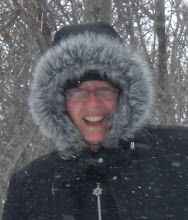The area we live in is a genealogy nightmare. By area, I mean the Yup’ik tribal lands, which are roughly the size of Texas. There are several reasons for these convoluted pedigree charts, and they are all deeply rooted in culture and tradition.
First of all, it is customary—and expected—that a girl will give her first child to her parents. This tradition began long ago when it made semi-sense. That child’s job in life was to be there to take care of the grandparents in their old age, so that when they were too old to gather wood or hunt and fish, there was someone to do it for them. Basically, the kid was doomed to a life of servitude. But the tradition continues today.
As for the girl who gave up her baby, the attitude seems to be a shrug of the shoulders, and “That’s just the way things are.” And girls are rarely married for their first couple of kids, so that usually isn’t an issue.
But this tradition has created an interesting kind of lifestyle. Now, you have some old lady with five or six teenage grandkids lounging around the house—or more likely exploding through the house—and the kids are in control. Although, the more kids the grandparent has in the house, the more money she gets from the government. So I guess they could claim that the kids still take care of their grandparents.
Keri dealt with one old lady here who has several teenage grandchildren living with her—and these kids don’t believe in attending school. Keri went to their house to talk to the grandmother. He went through the entire list of grandkids, and talked about each of their strengths and potential. Then he said, “They could all go on to college, but they need to graduate high school first. And in order to graduate, they have to attend.”
She looked at him like he was daft. “Why do I want them to go to college?” she said. “Then they will just leave and I will have no one to take care of me.” Interesting.
For the genealogists out there, here is part one of the nightmare. When a girl turns over her first baby, the adoption is rarely made legal. It is called a tribal adoption, meaning it is something that is just understood. The grandparent raises the child—unless the grandparent dies or decides they don’t want to any more—then the child gets passed onto someone else. The poor kid bounces around like a pinball. So if you wanted to know who the kid belongs to, you might get several different answers. There is the natural mother (who may not even know what town the child lives in), the “adoptive” mother (who has no actual legal claim and may or may not be caring for the child), and the person who happens to be taking care of the kid at the moment.
But for a REAL mind boggler, try following their tribal families. A friend who works for the state was telling me about a frustration she has to sort through. When an individual dies, especially a prominent person or a family member, then the next baby to be born is often named after that individual. That way, the person can live on. I know that is not an uncommon thing—but here is the kicker. That child then takes on the identity of the dead person. They step into their place in life. So the dead guy’s family has a claim on the baby, and vice versa. And the dead guy’s relatives become the baby’s relatives, in the same relationship as if the baby were the dead guy. Confused yet? Just wait.
There is a kid here in the village who was named after his dead uncle. So that means that all of his siblings and cousins are actually considered to be his nieces and nephews—including his own twin brother. Seriously. And that is how they introduce each other. It’s enough to give you a headache just trying to keep everyone straight. So this kid belongs to his own family (mother and father), but he also belongs to his extended family. He is considered to be his aunt’s brother. In fact, he would be his dad’s brother too. Talk about an identity crisis!
Yup, genealogy gets very convoluted here.
But I can think of one benefit to this mixed up existence. With so many people involved and families being so complicated, there would always be somebody else to point a finger at. As a mom, I was more than happy to lay claim on our kids when they were cute and adorable. But the day they did something stupid like egg a car out of the school bus window, or get hauled home by the cops for water ballooning, they suddenly became my husband’s responsibility. It was somehow his fault that our kids had done something dumb. Wouldn’t it be great to have an entire village to blame!
Subscribe to:
Post Comments (Atom)

The "It takes a village" thing has a whole new meaning where you live, doesn't it. And with a kid taking on so many different roles, he could actually BE the village!
ReplyDeleteThat is funny! He could also be the Village People--a one-man band.
ReplyDelete